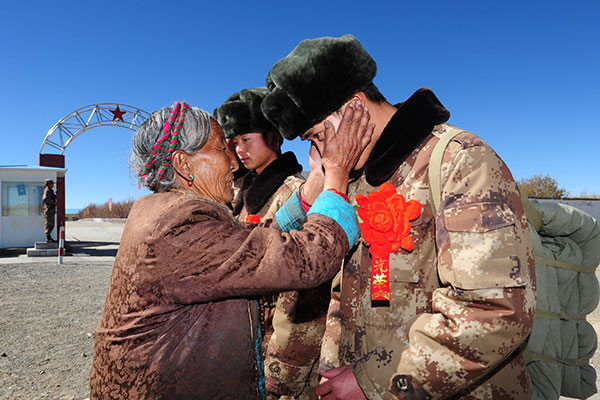|
 |
| Villager Chokyi says goodbye to veterans at a farewell ceremony at the border post in Tranglung, Gamba. PROVIDED TO CHINA DAILY |
Harsh conditions
However, were it not for Trang-lung's harsh climate and poor standard of living, it's unlikely that these young men would have forged such strong bonds of mutual trust and interdependence.
The soldiers often describe the weather as "villainous". Snowstorms block the dirt road for about eight months of the year, making regular patrols extremely dangerous. Although strong, the winds pose no real threat to fully equipped, well-trained soldiers.
The biggest challenge comes from the lack of oxygen. The guard post sits about 4,500 meters above sea level and the amount of oxygen in the air is less than half that found in the plains, so unnecessary strenuous activity is strictly prohibited. Medical experts have deemed the region "uninhabitable" for humans.
Despite that, the soldiers have to conduct regular physical exercise and military maneuvers. According to the Gamba Battalion Commander, Hu Guangjun, who commands four companies along the 140-km-long border, 85 percent of his troops have varying degrees of altitude sickness. Other problems include heart disease, high blood pressure, gout and injuries resulting from the intense winter cold.
About 60 percent of the soldiers have dangerously high levels of blood viscosity (thickness), and 30 percent have other problems, including amnesia, degeneration of the cranial nerves and weakened immune systems.
In the 54 years since the border guard was established, 31 soldiers have died at the mountain stations. In 1997, Liu Yan, a 21-year-old woman from Sichuan province who had traveled to Gamba to marry her soldier fiance, died of pulmonary edema in the barracks two days before the wedding.
In spite of this, none of the battalion's soldiers have quit their posts as a result of physical problems. Instead, many volunteer to remain in the highlands after serving two years, one term of duty in Gamba, including some gifted graduates from China's top military academies.
'Little favors'
Every one of the soldiers has a story to tell about how the veterans have taken care of them and how they adapted to the change in lifestyle when they arrived at the barracks.
"When I was too exhausted to carry a rifle on my first patrol because of anoxia (lack of oxygen), the squad leader carried it for me. One time I forgot to bring sun goggles when patrolling in the snow and rain, so an old soldier gave his glasses to me. He ended up seriously snow-blind as a result, but he didn't seem to mind," Liu Haiyang, a 19-year-old from Baoding, Hebei province, said.
Liu said "little favors" such as these happen almost every day as the new soldiers learn to adapt to the new environment. "That's how I built my trust with these older brothers," he said.
Peng Shaowei, a 26-year-old "seven-year" soldier from Meishan, Sichuan province, said: "The brotherhood is pure here. When you get used to it, you know you can always rely on the group. After that, you want to stay, and feel uneasy after leaving the group, even if you stay down on the plains where it's far more comfortable during leave."
Peng has decided to stay at Trang-lung for a further nine years, when he will retire "honorably" as a chief sergeant at least, and may even be promoted to a higher rank.
